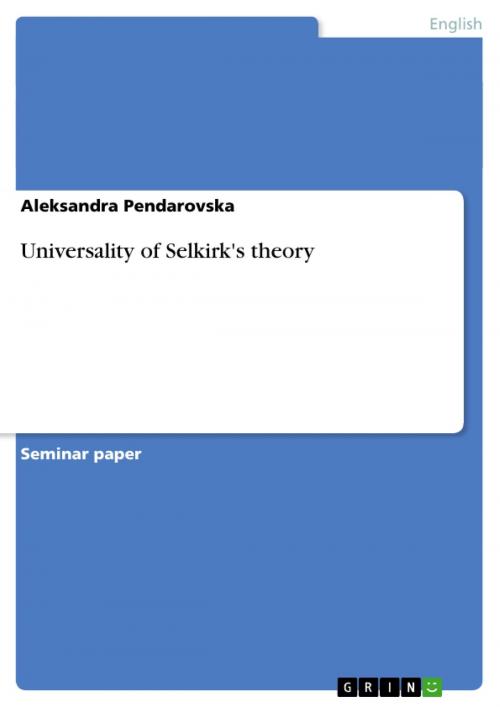| Author: | Aleksandra Pendarovska | ISBN: | 9783638395458 |
| Publisher: | GRIN Publishing | Publication: | July 12, 2005 |
| Imprint: | GRIN Publishing | Language: | English |
| Author: | Aleksandra Pendarovska |
| ISBN: | 9783638395458 |
| Publisher: | GRIN Publishing |
| Publication: | July 12, 2005 |
| Imprint: | GRIN Publishing |
| Language: | English |
Seminar paper from the year 2005 in the subject English Language and Literature Studies - Linguistics, grade: 2,3, University of Cologne (Englisches Institut), course: Hauptseminar 'English word formation', 8 entries in the bibliography, language: English, abstract: A particularly interesting subject in the area of morphology are the compounds as complex words with a specific semantic and formal structure. The aim of this paper is to support Selkirk´s universal theory for compounds by applying it to a typologically different language from English such as the south Slavic language - Serbian. The need for such an inquiry arises from the fact that Selkirk uses solely examples from English, although she claims that her theory can be applied universally. The research on this subject will comprise few steps, the first of which will be to look at the definitions and criteria for compounds both in Serbian and English in order to establish what word units are considered compounds in both languages. Then, the compound types generated by Selkirk´s general rewriting rule will be investigated as well as the 'systematic gaps' that occur both in English and in Serbian. Furthermore, an application of the principles of headedness, feature percolation and the first order projection condition in Serbian compounds will be carried out. These points should illustrate as already stated that Selkirk´s theory accounts for Serbian compounds as well, despite certain language specific characteristics. For the Serbian compounds the presented analysis will be primarily based on two articles of the Serbian linguist Dusanka Vukicevic as well as on the compound part of Matthias Rammelmeyer´s work on word formation.
Seminar paper from the year 2005 in the subject English Language and Literature Studies - Linguistics, grade: 2,3, University of Cologne (Englisches Institut), course: Hauptseminar 'English word formation', 8 entries in the bibliography, language: English, abstract: A particularly interesting subject in the area of morphology are the compounds as complex words with a specific semantic and formal structure. The aim of this paper is to support Selkirk´s universal theory for compounds by applying it to a typologically different language from English such as the south Slavic language - Serbian. The need for such an inquiry arises from the fact that Selkirk uses solely examples from English, although she claims that her theory can be applied universally. The research on this subject will comprise few steps, the first of which will be to look at the definitions and criteria for compounds both in Serbian and English in order to establish what word units are considered compounds in both languages. Then, the compound types generated by Selkirk´s general rewriting rule will be investigated as well as the 'systematic gaps' that occur both in English and in Serbian. Furthermore, an application of the principles of headedness, feature percolation and the first order projection condition in Serbian compounds will be carried out. These points should illustrate as already stated that Selkirk´s theory accounts for Serbian compounds as well, despite certain language specific characteristics. For the Serbian compounds the presented analysis will be primarily based on two articles of the Serbian linguist Dusanka Vukicevic as well as on the compound part of Matthias Rammelmeyer´s work on word formation.















